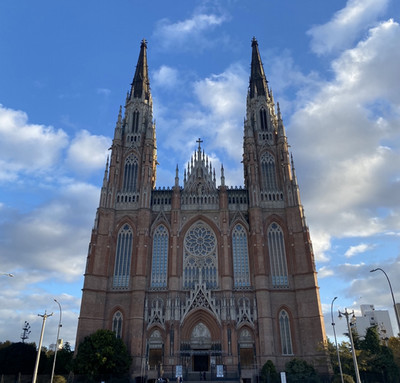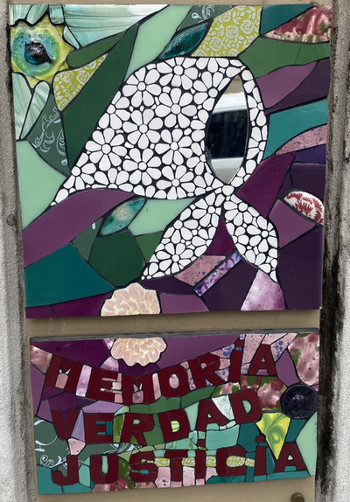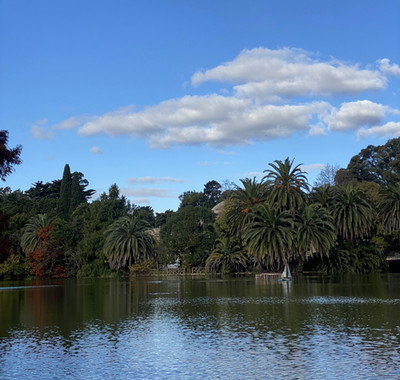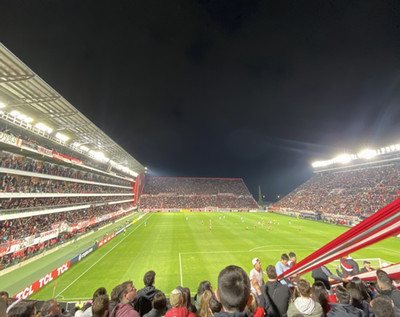The Importance of Memory
I arrived in Buenos Aires last Friday to what I can only describe as a winter tundra (45 degrees). Deep, deep down, I knew it was going to be winter when I arrived, but I have the incredible ability of being able to superficially convince myself of anything. That it would be summer in Argentina was one of those things. I stepped out of Ezeiza Airport and traveled to my home in La Plata not knowing what to expect or how I would meet people. As someone who thrives on the company of others, I really hoped to make fast friends with at least one person during my first weekend. To my surprise, it was easier than expected, and I had dinner with two marvelous people that evening, where I tried my first taste of asado.

After a weekend of making friends, I began my work at the Comisión Provincial por la Memoria. I am learning about the last dictatorship that happened from 1976-1983, and to say the magnitude of the atrocities is indescribably immense would be an understatement. Every day I learn more about how strategic, methodical, and cold the dictatorship was, disappearing about 30,000 people, killing people in vuelos de la muerte (death flights), maintaining extensive intelligence archives, and committing countless other horrific acts not only during those seven years, but for decades before and after. The CPM, however, has been able to transform some of those atrocities into beneficial programs for youth and for the family members of people who were disappeared. Archives the dictatorship once used to suppress people and destroy lives are now being used to help find relatives and inform inquirers of the intelligence that the government had collected about themselves or their relatives. One of the main sentiments of the organization is that the horrors of the dictatorship are not something of the past. They are ongoing, living on in various forms and continually affecting Argentinians. It is with this idea that they continue to inquire, research, and assist people in finding truth in the past.

The CPM also works to combat current human rights violations in Buenos Aires. Since the dictatorship, prison conditions havenot improved. In some places, theyhave gotten worse. The police still engage in oppression tactics, especially targeting those who fall into groups stereotyped as dangerous or suspicious. From what I have gathered, it’s best not for young men and boys to wear baseball hats; even strangers on the street warn me not to allow my hat-wearing friends into the home.
Besides my incredible introduction to the CPM, Argentina has been nothing short of wonderful thus far. The people are extremely kind and fun, so making friends has been a breeze. I live in a house with five (soon to be six) students who attend Universidad Nacional de La Plata, and it’s very interesting to hear how different their education system is from ours in the United States.
There are so many differences between here and the US. The first thing I noticed after arriving was that everyone stares. The amount of prolonged eye contact I make daily on the street is more than I make in over a week in Williamsburg. It’s rather refreshing because I too like to stare, so I feel very comfortable looking at everyone and everything without fear that people will think I’m weird. There is also the difference that evening events, like dinner and hanging out with friends, go much later into the night. I live in a perpetual state of mild sleep deprivation, but I do not complain.

This past Wednesday, I went with some friends to a soccer match for one of the La Plata teams. It was an all afternoon and night affair, and almost every one of the stadium’s 30,000 seats was occupied. On the way to the match, we passed innumerable police. Their presence before and after the match was nothing short of impressive. There were several checkpoints of police checking tickets, bags, and jackets, patting people down, and confiscating anything that could even remotely be construed as a weapon. Donning face shields, bulletproof vests, knee pads, and riot shields, the police were everywhere, watching for the first sign of trouble; there were also lines of police on horseback. I’m generally accustomed to some magnitude of police presence at soccer matches, but even in France during the 2016 Euro Cup final, I don't think I saw this many heavily armed police. After everything I learned from the CPM so far, I am not surprised that people were relatively wary of their presence, especially given the visible batons and guns.

But anyway, the match was an absolute blast, and I’m still hoarse from all the chanting. Estudiantes (La Plata) ended up losing to Huachipato (Chile) in overtime, kicking Estudiantes out of the Copa Libertadores, but it was a suspenseful and well-played game nonetheless. Afterwards, we ate choripanes and then went to play some truco and meet more friends.
As for what’s next, my friends and I have plans to go to the República de los Niños and Buenos Aires this weekend, and next week I should be diving deeper into work at the CPM. I cannot express how excited I am, both professionally and culturally, for the next nine weeks in Argentina. I’m sure it will be the adventure of a lifetime.